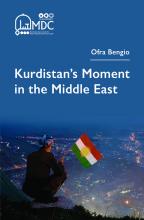
This book is a compilation of essays on Kurdish history, society, identity and politics covering developments over the last four decades. It reflects the sea-changes that have taken place in Greater Kurdistan and the sociopolitical processes it has undergone during this crucial time span.
Overall, the book challenges conventional wisdoms regarding the Kurds and their host states. It argues that due to their harsh treatment of the Kurds it was the central governments themselves which were the cause of instability in the Middle East rather than the Kurds who have been blamed for it. Another theme which was canonized by the West and which this book calls into question is the urge to maintain by force of arms the integrity of states such as Iraq, even if they have proved to be failed ones. It was this urge which made the West pay heavily, economically, militarily and politically throughout Iraq's hundred year of existence. Finally, the book argues that the international community's support of existing central governments and its disregard of the Kurdish national movements have bolstered the policies of denial and subjugation of the Kurds, policies that were common to all four states sharing Greater Kurdistan.
Ofra Bengio is Professor Emerita at Tel Aviv University and Head of the Kurdish Studies Program at the Moshe Dayan Center. She is the author of numerous works on the Middle East with special emphasis on the Kurds.







